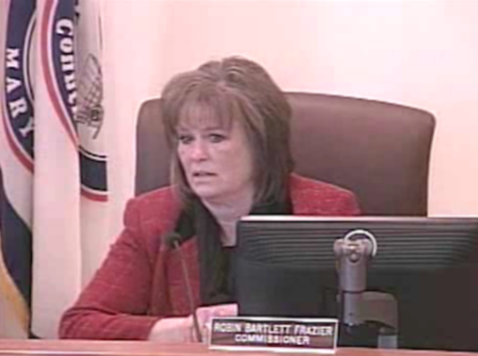
A Maryland public official made headlines this week with her decision to invoke Jesus in a prayer, contrary to a court injunction. Coverage of the incident has largely obscured the facts of the case: a left wing minority using anomalous precedent to prevent individuals from praying how they choose in a constitutionally protected manner.
Robin Frazier became a minor celebrity last week when, in defiance of a preliminary injunction barring public officials from invoking the name of any one deity in anticipation of the case going to trial, Frazier did so anyway. “That is an infringement on my First Amendment rights of free speech, and I think it is a wrong ruling,” Frazier said at the meeting subsequent to that injunction, emphasizing that she was willing to do what it takes to fight for her ability to express her religious beliefs in public. She also asked for justice in the name of Jesus Christ– a counter-infringement, if you will, on that ruling’s infringement of her rights.
Frazier appeared on Fox News Sunday afternoon and reiterated her commitment to the cause. Her outspokenness has attracted the attention of critics who accuse her of “grandstanding” and violating “common courtesy” by discussing her faith in public.
The attention has shifted from Frazier to the case itself, one in which the plaintiffs, including the anti-religious American Humanist Association, hope to use federal precedent to bar public officials from invoking the names of gods in anticipation of official business. Representatives of the American Humanist Association have made it clear that they aspire to remove any prayer, religion-specific or not, from government business despite tradition and Supreme Court precedent. “Our position is really that all legislative prayers, be it sectarian or nonsectarian, are exclusionary, especially to our members,” representative attorney Monica Miller told the Baltimore Sun.
Whether they will be able to achieve that in Frazier’s case depends heavily on two matters: whether the judge follows that federal circuit’s precedent on legislative prayer, and whether the Supreme Court will weigh in by issuing a ruling on a New York case nearly identical in facts to the case that has made Frazier the face of religious freedom in Maryland.
Most federal circuits operate under the precedent set by the U.S. Supreme Court in Marsh v. Chambers, a 1983 case that permits opening prayers at legislative meetings. “Clearly the men who wrote the First Amendment Religion Clauses did not view paid legislative chaplains and opening prayers as a violation of that Amendment,” wrote Justice Warren Burger, concluding that there was no precedent in Constitution that would prohibit this specific type of prayer. The Fourth Circuit courts, under which Maryland is governed, are an exception. Joyner v. Forsyth County establishes a rule that only sometimes falls in line with the Supreme Court: “[i]nfrequent references to specific deities, standing alone,” are permissible, but “prayers in a particular venue that repeatedly suggest the government has put its weight behind a particular faith,” are not.
With only Fourth Circuit precedent to guide him, the judge in charge of the Maryland case had no choice but to impose a preliminary injunction. As he does so, however, the Supreme Court mulls over Town of Greece v. Galloway, a case that threatens to render Joyner obsolete. The case involves a very similar lawsuit over legislative prayer, and comments from oral argument indicate that the Court may pass down a ruling that definitively protects the invocation of specific deities during legislative prayer.
During that oral argument, the Justices demanded an example of a prayer that would be universally acceptable to a number of religious groups without excluding one. Those arguing for the elimination of specific religions in such prayers could not find one that was universally acceptable, implying that maintaining an open-door policy to all religious would satisfy more religions than attempting to draft a one-size-fits-all prayer.
A ruling in Galloway is expected at the latest in June, and, should the ruling favor legislative prayer, highly diminish Joyner’s influence.
David Gibbs, lead counsel for the defendants in the Maryland case and general counsel of the National Center for Law and Liberty, told Breitbart News that his case is one of separation of powers: courts must ask themselves whether they have the power to censor public officials. “Does the court, for instance, have the authority to tell the President he can not conclude a speech with the words ‘God bless America?'” he asked, “One would hope not.” Gibbs also noted that the prayers discussed in the case have been performed in public settings for hundreds of years: “To have courts prohibit or censor certain words in any prayers is exactly the establishment of religion that our Founders objected to.”

COMMENTS
Please let us know if you're having issues with commenting.